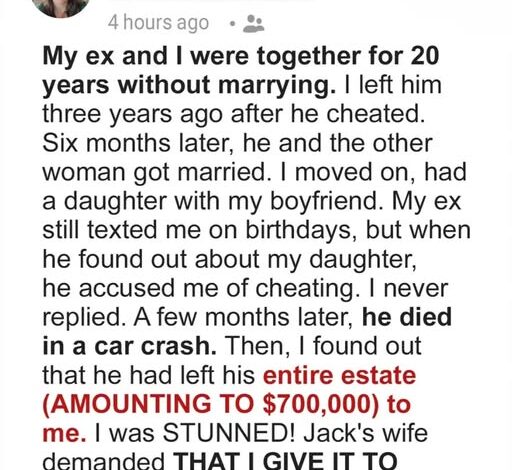
An Unexpected Legacy, What My Ex Left Behind!
When a relationship ends, most people assume the past will eventually blur into memory. That’s what I believed. After two decades with a man I thought I knew, betrayal severed our bond in a way that felt final. He remarried within months, proving that our story was truly over. I moved forward, slowly piecing together a life filled with peace and happiness. I had no intention of revisiting that chapter, no reason to believe our paths would ever intersect again in a meaningful way.
And yet, sometimes the past refuses to stay buried. One unexpected decision—made years after we parted—would return to me in a way that left me reeling.
For years, my ex was a shadow in the background of my life. Occasionally, a text would appear on my birthday or during the holidays. His words were never cruel, but they always stirred a mixture of nostalgia and unease. I would smile politely, send a brief response if any at all, and tuck the memories back into the quiet corners of my mind.
When he discovered that I had a daughter with my new partner, however, his tone shifted. The messages became sharp, bitter, and laced with accusations. Instead of joy for the life I was building, he offered resentment. I chose silence. I had no interest in reopening wounds that had taken years to heal.
Then tragedy struck. News reached me that my ex had been killed in a car accident. It was sudden and brutal, the kind of loss that shakes not only family but anyone who once shared life’s journey with him. Despite everything, grief hit me harder than I expected. You don’t spend twenty years with someone and emerge untouched by their absence.
But grief was only the beginning.
In the days after his death, as legal matters surfaced, I was confronted with a revelation that turned my world upside down: he had named me as the sole heir to his estate. Nearly $700,000, left entirely to me. His wife and children were excluded.
I sat in shock as I read the will. Why would he make this decision? Why bypass the family he had chosen after me?
It didn’t take long for his widow and children to confront me. They were furious, demanding to know why I would accept something that “rightfully belonged to them.” And the truth was—I didn’t know what to say. I hadn’t asked for this. I hadn’t expected it. The weight of the choice he had made felt less like a gift and more like a burden.
The questions swirled endlessly in my mind. Did he leave the estate to me out of lingering love? Was it guilt for the way our marriage had ended? Was it his way of apologizing for the betrayal that shattered us? Or was it simply an act of unfinished business, a tether he could never quite cut?
Every possible explanation carried both comfort and pain.
As the dust settled, I began to realize that the inheritance wasn’t really about the money. Yes, the figure was staggering. Yes, it could change my life materially. But the deeper impact was the message behind it. In leaving me his estate, he had acknowledged our shared history in a way words never could. It was as if, in death, he was finally speaking truths he could never voice in life.
I thought back to the years we spent together—the laughter, the fights, the quiet nights, the disappointments, and the dreams. For better or worse, we had built a life side by side for two decades. That kind of bond doesn’t simply evaporate, even when betrayal severs it. Perhaps, on some level, he never stopped feeling the weight of those years.
But knowing this didn’t make the decision easier. His family’s anger was raw and understandable. They saw me as the intruder, the ghost from his past who had stolen their future security. Legally, the estate was mine. Morally, the picture was far less clear.
I lay awake at night questioning myself. Should I keep what was left to me, honoring his explicit wishes? Or should I share it with the family he built after me, acknowledging their rightful place in his later life? Either choice carried consequences—financial, emotional, and ethical.
In the end, what struck me most was how legacies are never simple. They are not just possessions or bank accounts. They are choices, echoes of the past, and reflections of the lives we lead. My ex left behind more than an inheritance—he left behind a final, complicated statement about what I meant to him, about what we once were.
This forced me to look inward. Who did I want to be in the wake of this? A woman defined by anger and division, or someone who could rise above the bitterness of the past? Accepting the inheritance was not just about money—it was about acknowledging the history that shaped me and the resilience I had built since.
Inheriting from my ex was like being handed a mirror. It showed me not just what he thought of me, but who I had become since leaving him behind. I was no longer the woman who allowed betrayal to break her. I was someone capable of compassion, even for a man who had hurt me deeply.
The estate became a symbol of closure, but also of responsibility. It reminded me that life is fleeting, unpredictable, and often messier than we wish. The choices we make—who we love, how we leave, what we give away—become the stories others must live with long after we’re gone.
As I moved forward, I chose to honor both the letter of his will and the spirit of fairness. I set aside a portion of the inheritance to support his children, not because I was legally obligated, but because I wanted to. I could not erase their loss, but I could soften the blow. The rest I kept as he intended, a final chapter in a story neither of us could fully write while he was alive.
In the end, the inheritance was more than money—it was a message, a reckoning, and a reminder. We don’t always control how others see us or how they will remember us. But we can control how we respond to the legacies they leave behind.
For me, it meant carrying forward the lessons of a complicated past while building a future rooted in peace, dignity, and compassion. His final act was unexpected, but it forced me to reconcile who I was, who I am, and who I still want to be.
And maybe, just maybe, that was his true legacy.




